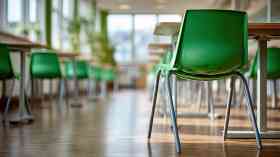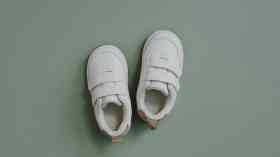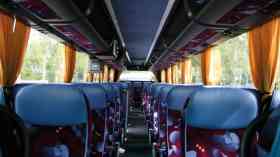
Expert Panel: Pandemic Recovery
Image shows (clockwise) Andrew Cameron, owner and founder, Intelligent Facility Solutions and To the Pump; Brian Warren, managing director, Nviro; Victoria Short, managing director - Randstad Public Services; and Chris Smith, head of community, Kajima Community
With Covid-19 still in the community, Education Business gathers the views of a range of experts on how schools can provide a safe environment for staff, pupils, and community-users
With coronavirus (Covid-19) still a real threat, schools have re-opened with new safety measures in place. They’ve had the difficult task of balancing risk management while still providing a full educational experience for children and young people.
This is all the more important given that 98 per cent of teachers believe their pupils are behind where they would normally expect them to be, according to a recent NFER report.
While class bubbles are no longer in place, school are still required to minimise the number of contacts that a pupil has during the school day. This is generally done by keeping children in year group ‘bubbles’.
Staggered drop-offs and pick-ups have also been implemented, to reduce the amount of parents on site at one time, as well as one way systems.
“The Department of Education have outlined a set of actions that all schools can take,” comments Victoria Short, managing director at Randstad Public Services. “Encouraging good respiratory hygiene will be key with the ‘catch it, bin it, kill it’ approach, amongst other hygiene measures.
“Something else to be considered is to have consistent groups or ‘bubbles’ of pupils and teachers. This will help minimise transmissions and also make it quicker and easier to identify who may need to be tested if a case does arise.
“Even though social distancing between pupils may be difficult to achieve, schools can still look to make minor adjustments to support distancing. For example, changing the seating arrangements and only keeping daily use furniture within the classroom to allow more space.”
Hand washing, hygiene and cleaning is central to the safe operation of schools in Covid times, as explained by Andrew Cameron, owner and founder of Intelligent Facility Solutions and To the Pump: “When it comes to official advice on reducing the spread of coronavirus, hygiene is at the very top of the list. WHO recommends regular washing and thoroughly drying the hands using either paper towels or a warm hand dryer, or using alcohol based hand sanitiser to kill any viruses on the hands.
“It’s critical that schools provide sufficient facilities and supplies in order to maintain the required hygiene standards, which means plenty of hand sanitiser stations around the building and sufficient soap and drying facilities - empty dispensers are not an option if headteachers want to keep their students safe.
“Hand sanitisers at every entrance, exit and high-traffic points might be something we’re used to seeing in medical environments, but this now has to become the norm for schools in the long term. Staff and students must adopt not just different habits, but a new, long-lasting mindset towards hygiene.”
Properly drying hands is an essential part of pupils’ hand hygiene routine. Andrew advises schools to consider swapping expensive and messy paper towels, that often create cross contamination points when reaching in to extract blocked paper dispensers, for touch free, low cost, HEPA filtered air hand dryers. “Unlike paper, hand dryers cause very little environmental damage and never run out,” says Andrew.
Looking long term, Andrew believes that school budgets must be readjusted to allow improved hygiene practices to continue as an ongoing strategy, not just a temporary ramp-up to get through the pandemic.
Clear and succinct communication around personal hygiene is essential, as well as making it fun for younger pupils, believes Brian Warren, managing director of Nviro. He explains: “From conversations with our clients and in our experience, positive messaging through signage, posters, and stickers is a great way of reminding people of new hygiene measures.
“Song and ‘gamification’ of hand-washing and social distancing may help to keep students, particularly younger ones, engaged.
“It’s also really important that teachers and school leaders pave that way and demonstrate these measures to the children – setting an example will help the culture change.”
Cleaning
Cleaning is a vital component in the fight against coronavirus. But how exactly should cleaning be conducted during a pandemic? Brian Warren from Nviro shares some advice: “The British Institute of Cleaning Science recommends a higher frequency of cleaning for touchpoints – door handles, light-switches, and other high-traffic areas. An increased hygiene solution is the best way to mitigate the risk of infection, which can take several formats. Additional operatives can be resourced to clean touchpoints and routinely disinfect hygiene-critical areas, ensuring potential contaminates are regularly and effectively removed from surfaces that children come into contact with throughout the school day. Innovation such as electrostatic spraying also enables the cleaning operation to be enhanced to further reduce the risk of transmission.”
Technology too can plan its part in cleaning. Brian Warren explains: “Ensuring environments are safe and hygienic is essential and innovative testing technology can be used to monitor hygiene levels. ATP testing works by assessing levels of living organisms on a surface using swabbing and ultraviolet technologies. This means cleaning providers can carefully monitor the effectiveness of cleaning and resource appropriately to target key areas that might pose a greater risk of transmission.
“Schools are rightly looking for reassurance from their cleaning providers that their environments are safe, and in addition to ATP testing we have been using a new-to-market PH spray to monitor hygiene. The spray uses a colour-changing solution to establish if surfaces have been fully disinfected and sanitised. A robust hygiene monitoring system is an important measure in maintaining safe environments.”
Andrew Cameron adds that cleaning can be supported with UV air sterilisers which can kill up-to 98.11 per cent of odour causing bacteria and viruses in air and on surfaces. “With no filters to change and minimal maintenance, the UV sterilisers provide an easy, environmentally friendly solution that reduces the need for consumable chemicals whilst supplying 24/7 air and surface sterilisation using a technology which creates powerful disinfectants of ultraviolet light, ozone, plasma and negatively-charged ions. All of which already exist in nature,” Andrew says.
Staff and recruitment challenges
During lockdown, more people were looking at teaching as a potential career, perhaps because it is seen as a secure job amid the economic and job uncertainty caused by the pandemic. The charity Now Teach reported a 70 per cent rise in numbers of applications in people wishing to become teachers under lockdown.
But with lockdown in place and social distancing a requirement, the recruitment of teachers and support staff may have been a challenge for some schools.
According analysis by SchoolDash, published in a joint paper with the Gatsby Foundation and Teacher Tapp, this year’s recruiting season has been “dramatically affected by the COVID-19 pandemic and resulting school closures”.
So how can schools overcome these challenges? Victoria Short comments: “Due to the physical barriers that have been in place since the beginning of the coronavirus outbreak, many schools have had to resort to recruiting remotely over the summer period. Like all other organisations, schools have been forced to adapt at speed to a new way of remote working and communicating.
“Using supply teachers may also have been a concern due to the risk of transmission, however as long as you take the relevant precautions and ensure any new member of staff coming into your school is aware of your safety protocols, supply teachers can play a key role within your school team amongst permanent staff.
“Within my own team of recruiters, we have ensured all our tutors, teachers and support staff have completed mandatory Covid awareness training in line with government guidelines. Furthermore, we can also let our schools know exactly where anyone coming to work in their school has been in the previous two weeks, supporting the school bubbles.”
It may be mandatory for schools to open, but staff may still be concerned about coming back to work. So how can schools reassure staff about coming into work during the ongoing pandemic?
Victoria Short said: “Communication will be key between all the stakeholders and particularly staff, to ensure they feel more comfortable to return to school. School leaders will need to ensure staff are fully aware of the additional measures the school has in place for everyone’s safety. There may also be a need for individual conversations with certain staff members who are concerned about returning.
“The current situation may be making some individuals more anxious than others and it is vital that as schools and employers, we keep a focus on mental health and are supporting the wellbeing of our staff where we can. At Randstad, we provide our candidates with access to a mobile app where they can quickly connect with a qualified counsellor via a telephone helpline and confidentially discuss any personal or work related issues.”
Third-party use of facilities
Schools also need to ensure that organisations using their facilities out of hours are adhering to Coronavirus safety guidance. Chris Smith, head of community at Kajima Community, explains how: “At present, we are following, and advising our partner schools to follow, the latest government advice around group sizes for activities. Schools under our BookingsGuru service can be confident that we are liaising regularly with activity providers, on their behalf, to ensure that guidelines are being adhered to. In addition we’re asking all hirers returning to our schools to carry out additional risk assessments and we’ve amended our codes of conduct and terms of hire to ensure robust procedures are in place to manage the safe return of activities. Class times will also be staggered to allow safe access and egress from venues.”
Those renting school facilities also need to ensure robust cleaning procedures are followed. Chris Smith explains: “We’re providing all of our schools with a COVID-19 Cleaning Guide which outlines additional steps which should be taken to ensure facilities are clean and safe to use. This includes more regular and thorough cleaning of communal areas, prohibiting access to changing facilities, cleaning of ‘high-risk’ touch points after each use of the space and restricting the use of certain types of equipment (those which cannot be easily cleaned, such as upholstered furniture).
“We’ve also introduced sanitising stations across our own schools and advised our partner schools to ensure this is in place at their sites too. Our site staff have received additional training around new cleaning protocols and we’ve introduced the use of special sanitising fogging machines to completely sterilise entire spaces over-night, ready for use by the school the following day.”
It’s important that those using school facilities after hours adhere to government guidelines when it comes to hygiene. Chris Smith comments on the steps Kajima Community has taken: “Community activities across our sites involve users of all ages and class sizes have been reduced with additional measures put in place to ensure good hygiene. Our principal customers are encouraged to communicate these new protocols to their users. In addition, as well as providing sanitising gel for customers on site we actively encourage our customers to bring their own to maintain maximum hygiene standards.
“The use of signage to remind users about their own personal hygiene as well as verbal reminders at the start and end of classes ensures good house-keeping. It is important that all users feel safe inside the schools and they see that staff are actively monitoring compliance of others that are sharing the communal spaces.”
Ensuring there’s a Plan B
Schools may be open to all pupils now, but there is still a high possibility of disruption to learning, for example, if pupils are self isolating, there are local lockdowns, or individual schools have to close due to positive cases. Schools are therefore expected to have a remote learning plan in place to support those that need to learn from home. So how can schools prepare so teaching can continue?
Victoria Short said: “I believe that as long as schools prepare contingency plans and plan ahead for various scenarios whilst utilising the experience gained from remote teaching, teaching can continue to a good standard.
“My advice would be to work collectively within your school, with other schools and with your recruitment agency if you use one to ensure that you have got plans in place to minimise disruption to learning. Communication is a two way street so do ensure that you not only communicate your plans to all relevant parties but also take feedback on what else to consider.
“Also, be prepared for another working from home scenario; ensure that your staff have what they require to do their job effectively from home. Talk with them and advise them. Preparation boosts confidence and minimises disruption. In any case, it will be important to keep your staff informed and motivated, be it physically or remotely.”
Brian Warren from Nviro said: “Keeping children in education is a priority and with additional measures in place, such as managing personal hygiene, sanitising personal workspace, additional cleaning and testing surfaces for safety levels, schools could still offer a safe place of learning for children.
“In the event of educational facilities closing or reducing capacity, cleaning providers should work in partnership with schools to maintain safe environments. We know the importance of keeping students safe in school and recommend maintaining a minimum standard of cleaning, such as wiping down surfaces and touchpoints. This means that once the lockdown eases, education can resume as soon as possible. A decontamination clean of all floors and surfaces is also essential in the event of a suspected case or if a student is self-isolating, and throughout this time it’s crucial that schools and educational settings work closely with their cleaning providers and communicate any changes. Schools must feel assured that their provider will maintain a safe, clean, and hygienic environment.”
Andrew Cameron believes that we are now better equipped to deal with lockdowns. He said: “Local lockdowns are already happening, and people are much more geared-up to act quickly and appropriately to see the mini-lockdowns through successfully. Young people are much more clued-up on the importance of good hygiene, and what they see happening in schools in terms of reminders, facilities and consistent messaging should help them to remain hygienic and safe as they continue to work from home.”
Commenting on the innovation seen from activity providers during lockdown, Chris Smith says: “Throughout the initial lockdown, we heard from many enterprising hirers who were looking at new, innovative ways to deliver sessions to their users. Instead of physical classes, many hirers moved to hosting sessions online.
“From fitness sessions to children’s dance, Pilates and language classes, we’ve seen a real influx in online activity that has in some cases benefitted a whole new audience, as people from outside of the local area have been able to access sessions they would not normally have been able to. This online presence has not only resulted in people continuing to be active but undoubtedly contributed to their mental well-being. Schools can prepare to re-activate physical, onsite lettings by planning a phased re-opening of firstly, outdoor facilities and those indoor facilities where additional space can be offered to accommodate social distancing.”
Expert Panelists
Biographies
Brian Warren, managing director, Nviro
Brian is the Managing Director of Nviro, a leading provider of cleaning and hygiene services. With a background in the education sector, he is passionate, driven, and caring in aligning staff and customers with a common purpose of providing safe, clean, and hygienic environments in which everyone can thrive.
Andrew Cameron, owner and founder, Intelligent Facility Solutions and To the Pump.
Sheffield-based businessman, Andrew Cameron, founded Intelligent Hand Dryers in 2012 when he discovered a gap in the market for environmentally-friendly washroom solutions and hand drying in commercial premises and educational institutions. During the pandemic, Andrew and his team launched a new brand, To the Pump, to help organisations reopen their businesses responsibly, efficiently and cost effectively, with a portion of sales revenue to be directed straight to Self Help UK's COVID-related charity work.
Victoria Short, Managing Director - Randstad Public Services
With over 20 years of experience in the Randstad Group, Victoria Short heads up Randstad's busy public services division. Her expertise lies in leading the way in the growing area of managed service provision and flexible labour resource management.
Chris Smith, Head of Community, Kajima Community
Kajima Community provide lettings solutions to schools across the UK. Their solutions are designed to help venues not only to maximise the income from their facilities but to use the spaces to provide a hub for the local community and support local activity providers. Chris Smith has over 16 years’ experience of the school lettings market as well as previous experience in health and sports development.
Latest News
31/10/2025 - 10:12
A growing number of UK children are now eligible for Free School Meals (FSM), yet most still aren’t taking advantage of them on a daily basis, new research reveals.
30/10/2025 - 01:28
In the wake of the Raac crisis, the DfE spent £5 million on research into the condition of school buildings, which is due to conclude in spring 2026.
30/10/2025 - 01:09
Malmesbury Primary School in Wiltshire has submitted plans for a major expansion, funded by entrepreneur James Dyson.
30/10/2025 - 00:55
Monday's Every Pair Tells a Story campaign to protest to highlight the national crisis in SEND provision.
29/10/2025 - 09:19
Estimated data from the Department for Education reveals that 470,000 pupils under 16s use local authority funded transport to get to school.







